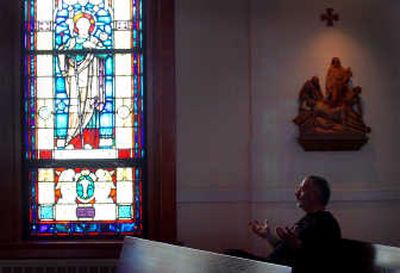Empty stomach, full heart (on fasting)

For the next 40 days, Maurice Smith will eat almost nothing.
As he observes the season of Lent, the Spokane resident will drink water and Gatorade throughout the day and eat only broth or maybe tomato soup for dinner.
During this extreme fast – which he has done twice a year for the last 12 years – Smith allows his digestive system to practically shut down.
While he suffers through hunger pangs during the first few days, his body launches into conservation mode. His metabolism drops. Muscle and fat break down. Ammonia and nitrogen are released into his blood causing nausea and fatigue. After the first week or so, the hunger dissipates and Smith gets used to the light-headedness, the chills and the weakened state of his body.
“It is an act of sacrificial worship,” said Smith, who is calling attention to his fast this year to raise awareness of the problem of hunger in Spokane. ” … For me, (fasting) is soul-searching, reflection and crying out to God.”
Abstaining from food – for a meal, a day or longer periods of time – is a spiritual discipline for many religions. Muslims don’t eat or drink from sunrise until sundown during their holy month of Ramadan. Jews fast on Yom Kippur, the Day of Atonement, as well as during the solemn observance of Tisha B’Av. Hindus, Baha’is and other people of faith also observe the practice.
Now, as Christians worldwide embark on the season of Lent – which starts Wednesday for Protestants and Catholics and at sundown on March 9 for Orthodox churches – many in the region will fast to enhance their spiritual life.
But before skipping meals or undergoing a fast, medical experts advise people to always be careful and seek counsel from their doctor.
“When you deprive yourself of food, your body goes into shock,” said Marilyn Lukes, a registered dietician and certified diabetes educator at Deaconess Medical Center. “You experience light-headedness, hunger, grouchiness, mood swings. … Metabolically, your body is asking, ‘What’s going on?’ Then it goes into conservation mode.”
Lukes and other health experts caution against fasts lasting more than a few days. She also doesn’t recommend it for people with diabetes, especially if they take insulin, as well as young children, the elderly and pregnant and nursing women.
“As a general rule, anybody who has an inkling of a health problem shouldn’t be fasting without the supervision of a doctor,” Lukes said.
During Lent, many Roman Catholics abstain from meat on Fridays. They also fast on Ash Wednesday and Good Friday by skipping snacks and eating only one meal for the day. Orthodox Christians give up not only meat but also fish and dairy products, which means they become vegans for the entire season of Lent.
Some people choose to fast by refusing to eat all food and drinking only water and juice. While most people do this for only a day at a time, Smith and a few others choose to extend their fast for an entire 40 days.
“People want to be close to the Lord,” said Dan Grether, who helped organize “40 Days of Fasting and Prayer,” an initiative about 10 years ago that involved more than 50 churches in the Inland Northwest. “Fasting requires a depth of repentance and a cleansing of our hearts. It gives us a better ability to hear what the Lord is saying to us.”
Some fasters say abstaining from food makes them more aware of the body’s cravings. It’s also a time of self-examination and repentance, says Grether, which then brings them closer to God. Fasting also provides them with a few health benefits – including weight loss and elimination of toxins.
There was once a time in his younger years when Smith could survive on just water and Gatorade for 40 days, he says. Now that he’s 53, he’ll eat soup at night for nourishment. He also continues to take his blood-pressure medication.
“I may be a fanatic, but I don’t want to do anything foolish,” said Smith, who has provided seminars on fasting to area churches. “I certainly don’t want to fast my way into heaven.”
During his fasts, Smith sheds as much as 25 to 30 pounds, he said. But by the end of the 40 days, he also loses muscle mass in addition to fat. So he’s often physically too weak to do much, he said. The fasting Smith has been practicing for the last three decades, particularly the more extreme form he has observed in the last 12 years, has inevitably taken a toll on his body, he acknowledged.
Fasting doesn’t have to be dramatic or life-threatening, Smith emphasized. People can just skip a meal and use that time to meditate and pray, he said. Or they can use the money they would’ve spent on that food and donate it to an organization that feeds the hungry.
Smith doesn’t usually bring attention to himself while he’s starving for 40 days. This year, however, the executive director of the nonprofit Feed Spokane announced his decision by launching a campaign called “Fasting to End Hunger.”
“I wanted to call attention to a public need as well as to a Biblical mandate, namely, to feed the poor,” he said.